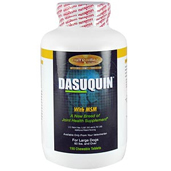Arthritis affects 20 percent of adult dogs in the U.S., making it one of the most common causes of chronic pain in canines, according to the Arthritis Foundation. This degenerative joint disease is marked by decreasing cartilage and synovial fluid, leaving bones unprotected against painful friction and wear. Only your veterinarian can diagnose arthritis after obtaining a complete medical history, performing a physical examination, excluding other causes of your dog's symptoms, and administering X-rays or other tests.
"Joint supplements are commonly used to slow the progression of arthritis in dogs and to ease associated symptoms."
While lifestyle changes can greatly improve your arthritic dog's quality of life, supplements, pet medications, and other forms of medical treatment are usually necessary to control pain and inflammation and prevent further joint degeneration. Never give your pet a product made for humans unless explicitly instructed to do so by your veterinarian; many human products are toxic to dogs.
Managing Arthritis with Dietary Supplements
Nutritional supplements are commonly used to slow the progression of arthritis in dogs and to ease associated symptoms. Effective products supply compounds that help protect and rebuild cartilage and increase joint lubrication. Joint supplements containing chondroitin, glucosamine, avocado soybean unsaponifiables (ASU), methylsulfonylmethane (MSM), and/or hyaluronic acid (HA) are good options. Supplemental fatty acids can help reduce inflammation and related pain, and increased antioxidant intake may also be of benefit to arthritic dogs.
Treating Arthritis with Medications

Non-steroidal anti-inflammatory drugs, or NSAIDs, are typically a major part of therapy for arthritis. They are useful because they treat both the inflammation and the pain associated with the condition. Aspirin, carprofen, and etodolac are NSAIDs frequently used in dogs. Your veterinarian may also recommend other over-the-counter or prescription-strength painkillers or anti-inflammatory agents, depending on the severity of your dog's condition and other individual factors. Corticosteroids, for example, may be useful for severe cases.
Other Forms of Medical Intervention
When joint degeneration and related symptoms are particularly severe, treatment beyond dietary supplements and medication may be necessary. Visco-supplementation with a product like Adequan Canine is one option that involves the injection of a lubricating substance such as hyaluronic acid directly into affected joints. In the most severe cases, surgery is a treatment option. Affected joints may be replaced, cartilage debris can be removed from joints via arthroscopic incisions, bone protrusions may be removed to relieve friction, and other operations can repair problematic joint and bone structures or alignments as needed.
References
http://www.arthritis.org/arthritis-dogs.php
http://www.aspca.org/pet-care/dog-care/dog-care-arthritis.aspx
http://www.aspca.org/pet-care/dog-care/dog-care-canine-arthritis.aspx
The above is provided for information purposes only and should not be used for the diagnosis or treatment of any condition.
This information does not cover all possible variables, conditions, reactions, or risks relating to any topic, medication, or product and should not
be considered complete. Certain products or medications may have risks and you should always consult your local veterinarian concerning the treatment of
your pet. Any trademarks are the property of their respective owners.